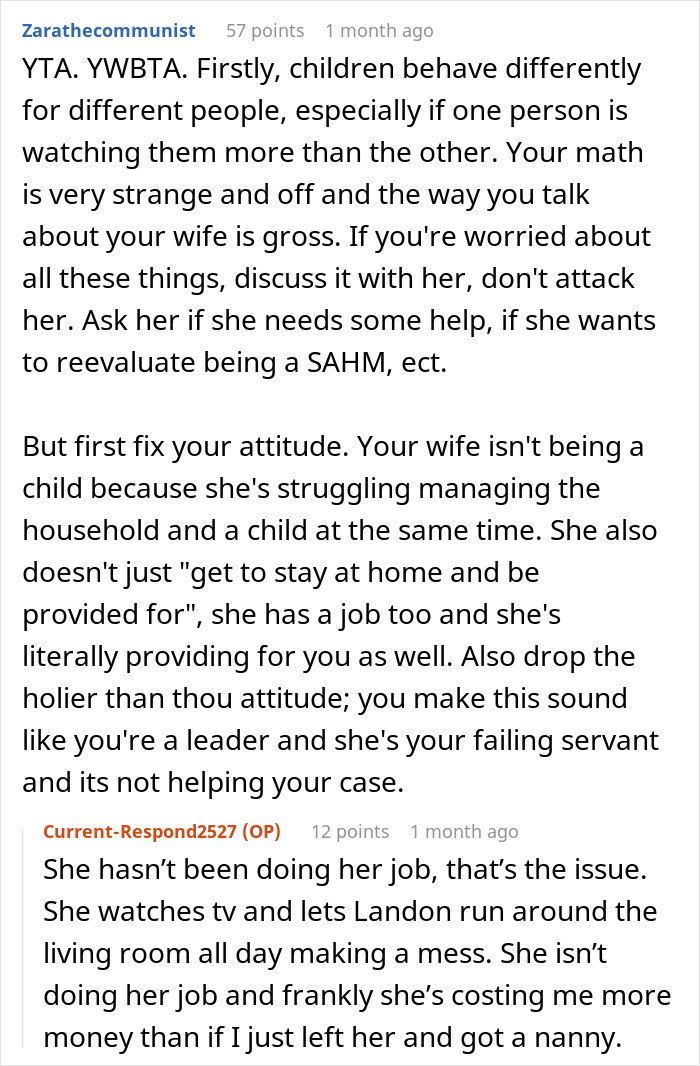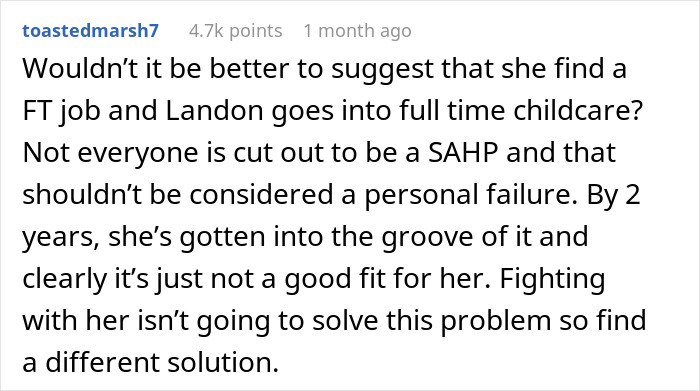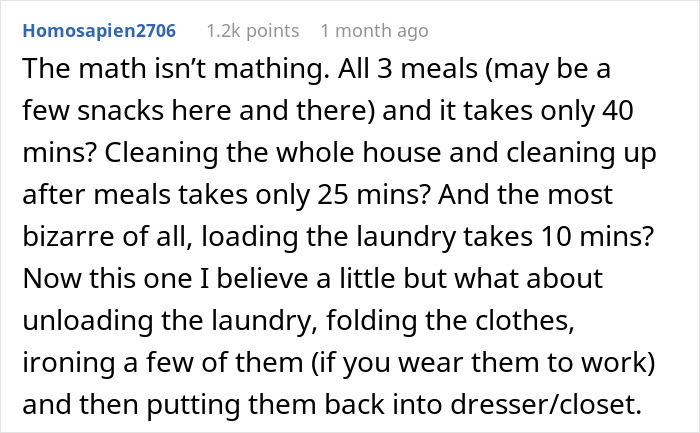In any romantic relationship, it’s important to remember that you’re supposed to be part of the same team. You’re meant to be on the same side and support one another. However, some folks see their relationships as purely transactional, which is far from healthy.
One anonymous husband turned to the r/AITAH online community for advice regarding a delicate situation at home. From his perspective, his wife, a stay-at-home mom, doesn’t do ‘enough’ chores around the house. Many internet users were absolutely appalled by his point of view and stood up to defend his wife. Scroll down to read what they had to say.
Housework and childcare can be very divisive issues and lead to some resentment between partners

Image credits: Sarah Chai (not the actual photo)
One husband shocked the internet by sharing his perspective about his wife, who is a stay-at-home mom

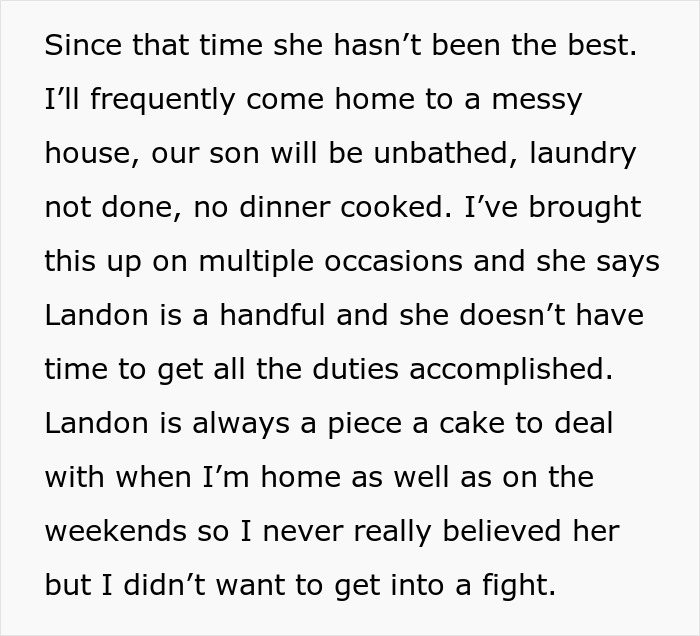

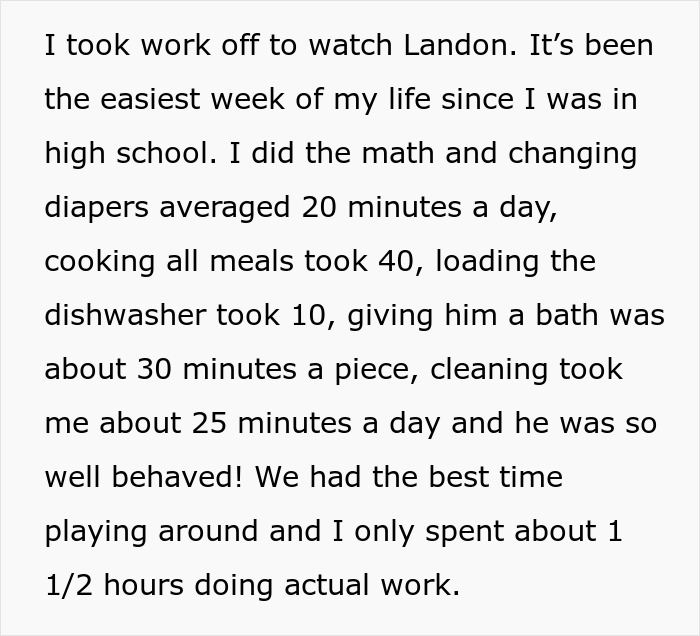

Image credits: MART PRODUCTION (not the actual photo)




Image credits: Current-Respond2527
The author shared a lot of controversial opinions in his story
The husband, who wrote the controversial post, seems to have an issue with his wife not doing her ‘duties’ or pitching in as much as he thinks that she ‘should.’
From his perspective, because he is the sole breadwinner in the family, his wife ‘should’ do all the housework, along with all the childcare. The OP believes that she should have no problem doing all of this because he himself did everything that needed to be done at home in record time.
“I’m planning on telling her after living in her shoes for a week that I need her to step up to the plate because the amount of effort she’s been putting in is unacceptable. If she doesn’t do it I think I will have to leave her because I don’t feel like taking care of two children,” he wrote.
Many internet users who read his posts and comments were shocked by his uncompromising and cold position, as well as his opinion about women in general.
In one comment, the author stated that, for him, “Marriage isn’t about love it’s about continuing the family name and bloodline.” However, elsewhere, he comments: “I can love my wife and be mad she isn’t doing her part.” What’s more, it’s bizarre how easily the author wrote about the possibility of divorcing his wife.
If money isn’t an issue, it might be best for everyone involved to simply hire a housekeeper and a nanny. Spending a bit of cash to keep the house tidy may be a better alternative to being resentful about the chores not being done ‘right.’

Image credits: RDNE Stock project (not the actual photo)
If there are serious issues at home, it’s best to discuss them in person. However, it’s vital not to be accusatory
Whatever the marital issues might be, it’s important to bring up those questions in a face-to-face discussion. There might be a genuine problem with the housework and childcare in the family. However, how you approach these sensitive topics is vital.
For one, you should never sound like you’re accusing your partner of something. This means reigning in excess judgment and focusing on how their actions and behavior affect you and make you feel.
Remember, the goal isn’t to browbeat your partner into submission or force them to adapt to your requirements. The aim is to find some sort of compromise that would make both people satisfied.
For instance, hiring a part-time housekeeper really might be the best solution. Or, the husband could pitch in with the chores (considering how little time he thinks they take) to match the standards he wants to see at home.
Meanwhile, even if one person is the primary breadwinner, it hardly seems fair that they should never do any of the housework or childcare. Being in a relationship and raising kids together means pitching in as much as you can and as needed, regardless of the circumstances.
There will hardly ever be situations where the couple has a perfect 50/50 split of chores. But you don’t need things to be perfectly balanced. What you need to aim for is a balance that works for you. If one partner works more, they might do slightly fewer chores at home than someone who might, for instance, work less or remotely.
Another good solution is to divide the chores up based on preferences. For example, one partner might not mind doing the dishes and vacuuming, while the other actually enjoys doing the grocery runs and cooking. If there’s an activity both partners hate, they could split it equally among themselves to make it fair.

Image credits: Juan Pablo Serrano Arenas (not the actual photo)
The post got a lot of different reactions. Here’s what some readers had to say about the entire situation
